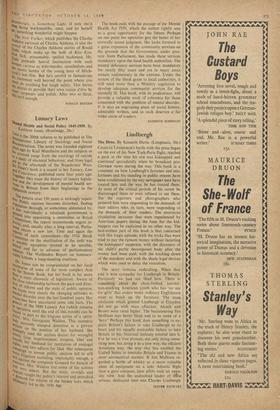Lindbergh
The Hero. By Kenneth Davis. (Longman's, 30s.) CHARLES LINDBERGH'S battle with the press began on the eve of his New York-Paris flight, reached a peak at the time his son was kidnapped and continued sporadically when he broadcast pro- German views during the war. This book is a comment on how Lindbergh's fortunes and mis- fortunes and his standing in public esteem have been conditioned by the way newspaper men have treated him and the way he has treated them. At most of the critical periods of his career he discouraged them or even refused to see them. Yet the reporters and photographers who pestered him were responding to the demands of their editors who, in turn, were responding to
the demands of their readers. The enormous circulation increases that were experienced by American papers during the hunt for the kid- nappers can be explained in no other way. The best-written part of this book is that concerned with this tragic episode, with the tricks that were tried to pay the ransom money without incurring the kidnappers' suspicion, with the discovery of the child's partly decomposed body after the money had been paid, with the tracking down of the murderer and with the shady legal devices which were used to delay the execution.
The story remains enthralling. When first told it won sympathy for Lindbergh in Britain. Previously we had not liked him. There is something about the clean-limbed, teetotal, non-smoking American youth who has `no use for girls' that makes many ordinary Englishmen want to break up the furniture. The mass adulation which greeted Lindbergh at Croydon did not go with mass affection. Alcock and Brown were rated higher. The buccaneering Jim Mollison was better liked and to us more of a `hero.' Perhaps this book does something to ex- plain Britain's failure to take Lindbergh to its heart and his equally noticeable failure to take Britain to his. National jealousy entered into it. For he was a true pioneer, not only doing some- thing new, but doing it in a new way, the efficient American way, the way that has enabled the United States to overtake Britain and France in most aeronautical matters. If Jim Mollison re- garded a bottle of whisky 'as a more valuable piece of equipment on a solo Atlantic flight than a gyro compass, later pilots took an oppo- site view. And the undoubted leader of Cffise serious, dedicated men was Charles Lindbergh.
OLIVER Sri WART






































 Previous page
Previous page